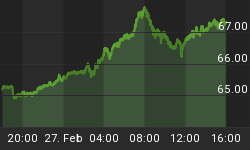Last weekend, Ben Bernanke took an unprecedented gamble for a sitting Fed Chairman: he granted a long-form interview to 60 Minutes, America's most watched news program. There can be no doubt that the interview came about as the result of a coordinated strategy between the Obama Administration and the Federal Reserve. But was the decision to offer the public a rare look at the inner workings of the central bank an act of resolution or desperation?
In the interview, Bernanke stressed the importance of political will to end the current crisis. No doubt Bernanke himself hoped that his candor alone would serve as a representation of that will. But talk is cheap. We all agree that reform must be undertaken, but to what end? Nothing in his discussion with 60 Minutes gave any indication that Bernanke was ready, or willing, to grapple with the real problems that underlie our economy.
While the need to "cut wasteful government spending" has become a mantra of every political campaign for the last four decades, Washington has embarked on the largest expansion of government in our history. If Bernanke were hinting at a generational change that would reverse this sad record, now would indeed be the time to sell it to America. But what if all he meant to do was sell the same 'change' that Mr. Obama served to us during the campaign? This "change" has revealed itself to be no more the same failed policies of the prior administration - only more aggressive and more dangerous. For example, Obama's latest stimulus package had some 8,000 earmarks-the very pork that Obama vowed in his campaign to stop. Breaking this system of unlimited spending would indeed require political will of epic proportions, but Mr. Bernanke has not addressed this issue in the slightest.
For decades, massive Government spending was not financed through fiscally sound means such taxes or government reserves but merely by the issuance of debt. In 2000, the published U.S. Treasury debt was a staggering $5 trillion. Today, it is approaching three times that number. If non-public debts and IOU's are included, the national debt amounts to some $55 trillion!
In recent months alone, hundreds of billions of dollars of have been allocated by Congress for a short-term "rescue" of the financial system. This all must be to set the stage for deeper reforms, right? Wrong. Instead, massive amounts were spent to bail out counterparties of AIG, such as Goldman Sachs, at par, rather than allowing them to pay for their recklessness. As if that were not enough, it is now emerging that tens of billions of the taxpayer funds were used to give bonuses to the very bandits who gambled away much of America's financial future.
So far, the Government has given no indication that it will claw back these ill-gotten gains. On the contrary, the Administration has hidden behind a strict legal interpretation of the bonus agreements. Only this past Monday, under great grassroots pressure, did the Administration announce that they would even begin to resist the $165 million in AIG bonuses. This is how much political will it takes to resist AIG, in which the government has a controlling interest. How much would it take to achieve fundamental reform?
Did Ben Bernanke even have reform on his mind when he spoke, or was he hinting at something far more sinister? Perhaps he simply meant that the political class will need the fortitude to steamroll these policies over the American people despite the people sounding alarms about the price tag.
The Fed Chairman has access to prime information from many quarters and often well in advance of publication. Indeed, some information he receives is likely never published. Furthermore, Ben Bernanke is a student of the Great Crash. As such, Bernanke must be well aware of the true threat that the current severe recession is morphing rapidly into a worldwide depression, possibly worse that 1929-1934. As such, it could threaten the vital international supply chains of major U.S corporate giants. What kind of political will could overcome their short-term pressures to serve the general good? Obviously, the kind of will the Fed Chairman cannot muster.
The American public is now in a mood of mounting anger. They know this so-called stimulus amounts to generational robbery. So yes, political will is essential, not to convince the people they are wrong, but to acknowledge that they're right.
For a more in-depth analysis of our financial problems and the inherent dangers they pose for the U.S. economy and U.S. dollar, read Peter Schiff's newest book "The Little Book of Bull Moves in Bear Markets." Click here to order your copy now.
For a look back at how Peter predicted our current problems read the 2007 bestseller "Crash Proof: How to Profit from the Coming Economic Collapse." Click here to order a copy today.
More importantly, don't wait for reality to set in. Protect your wealth and preserve your purchasing power before it's too late. Discover the best way to buy gold at www.goldyoucanfold.com. Download Euro Pacific's free Special Report, "Peter Schiff's Five Favorite Investment Choices for the Next Five Years", at http://www.europac.net/reports.asp. Subscribe to our free, on-line investment newsletter, "The Global Investor" at http://www.europac.net/newsletter/newsletter.asp. And now watch the latest episode of Peter's new video blog, The Schiff Report, at http://www.europac.net/videoblog.asp.















